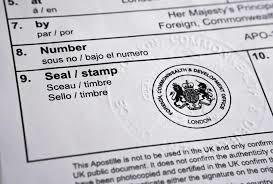What is an "Apostille" ?

What is an “Apostille” ?
An apostille is a form of authentication that seeks to simplify the process of legalising and authenticating public documents so that they can be recognised internationally in foreign countries that are members of the 1961 Hague Convention Treaty (“the Apostille Convention”). Put simply, it’s a certificate that makes “local” documents valid for international use.
In this country, an apostille is issued by the Foreign, Commonwealth and Development Office (FCDO), which has its Legalisation Department based at Hanslope Park near Milton Keynes.
The word is derived from the French word “apostille” meaning “a marginal note” – itself derived from the Latin post (“after”) + illa (“these”). It can be used as a noun and also a verb (third-person singular simple present apostilles, present participle apostilling, simple past and past participle apostilled).
In the United Kingdom, an apostille is printed on a piece of paper and attached to the notarial certificate or document itself. It will be signed by the individual issuing the apostille, and will be embossed by the seal of the FCDO. It is also possible to apply for an electronic apostille or “e-apostille” in some cases which is quicker and more cost effective.
If a country has signed up to the Apostille Convention, any document going to that country will need to be apostilled.
Every apostille must contain the following ten fields:
- COUNTRY (e.g. UK)
- HAS BEEN SIGNED BY (e.g. the name of the notary public)
- ACTING IN THE CAPACITY OF (e.g. notary public)
- BEARS THE SEAL/STAMP OF (e.g. High Court of Justice)
- AT (e.g. either the authority giving the apostille or municipality)
- THE (e.g. the date the apostille is issued)
- BY (e.g. person at FCDO signing the apostille certificate)
- NO (e.g. unique reference number for the apostille)
- SEAL/STAMP (e.g. of the FCDO)
- SIGNATURE (e.g. of the FCDO official signing the apostille)
If sending a document abroad, you will need an apostille for most countries.
Here are some of the most common documents that need to be apostilled:
Educational certificates issued in the UK
Birth/Death/Marriage Certificates
HMRC certificates/documents
Many of these documents will need to be notarised first before they can be apostilled. However, some documents don’t need to be notarised, and can be apostilled directly. These are typically public documents issued by UK government departments/bodies, for example:
- ACRO police certificates
- Birth, death and marriage certificates
- Certificates of No Impediment
- Certificates of Good Standing / certified Companies House documents
- Court orders
These documents will need to have a wet-ink signature from the issuer on them. If they do not, they will need to be notarised first.
Some countries are happy to accept documents notarised in England and Wales without an apostille. These countries are typically Commonwealth countries, such as Australia, Canada and South Africa, and most states in the USA. However, it’s important to note that some Commonwealth countries may still insist on your document being apostilled despite being notarised in the UK.
It is recommended to check with the person/organisation requesting the document to see whether they would accept the document without the apostille, but if they want an apostille , they will usually insist on one being affixed.
An apostille is issued with a unique apostille number. To verify the authenticity of an apostille, you can go to https://www.gov.uk/verify-apostille.
